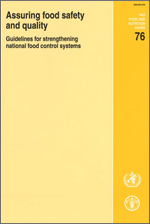Food control management
Official Food Control encompasses a number of mandatory activities performed by competent authorities, under their regulatory mandate, and are necessary to ensure the quality and safety of food, thus protecting the health of consumers and their economic interests. The decision-making process to direct these regulatory activities, also called food control management, should be based on evidence and risk analysis. In particular, the risk management framework provides a continuous process for planning, organizing, monitoring, coordinating and communicating, in an integrated way, a broad range of regulatory decisions and actions to ensure the safety and quality of domestically produced, imported and exported food for national consumers and export markets, as appropriate. Food control management establishes leadership and administrative structures with clearly defined accountability for a number of functions.
Establishment of an effective framework for food control
An effective national food control system requires policy and operational coordination at the national level in accordance with the particular governmental or constitutional arrangements and institutions, national goals and objectives and requires the establishment of one or several competent authority(ies) with the responsibility to manage the effective operations of the national food control system. The competent authority(ies) has a pivotal role in the national food control system by:
- Providing leadership and coordination for the national food control system;
- Designing, developing, operating, evaluating and improving the national food control system;
- Establishing, implementing and enforcing science and risk-based regulatory requirements that encourage and promote positive food safety outcomes;
- Establishing, implementing and enforcing regulatory requirements to support fair practices in the food trade;
- Establishing and maintaining arrangements with supporting organizations such as officially recognised inspection, audit, certification and accreditation bodies, where appropriate;
- Advancing and fostering knowledge, science, research and education regarding food safety;
- Engaging with stakeholders to ensure transparency and to obtain their views; and
- Where appropriate, establishing and maintaining arrangements with other countries, e.g. cooperation programs, equivalence agreements, etc.
It is important that effective communication and coordination mechanisms allow competent authorities to plan and implement their course of action in support of common and consistent policy objectives. Where there are several competent authorities within a national food control system, they should operate in a cooperative and coordinated manner, within clearly assigned roles and responsibilities, for the most effective use of resources in order to minimize duplication and/or gaps and to facilitate information exchange.
Food control management also covers the various policy and operational responsibilities of competent government authorities responsible for food control. These include the development and implementation of food control policies, strategies and plans that reflect the government’s commitment to food safety and quality and provide a sound framework for food control activities.
Foundational to the work of a competent authority is a food safety legislation that provides it with the range of powers and mechanisms sufficient to manage and operate the national food control system, reflecting the intended policy objective and commensurate with the risks it is intended to mitigate.
Collectively, competent authorities should work in a manner that ensures:
- Situational awareness – managerial decisions should take into account accurate and current information on the entire food chain;
- Pro-activity - a national food control system should be capable of identifying existing or emerging hazards before they materialize as risks in the food production and/or processing chain and at the early stages rather than in the end product. Early warning and/or rapid alert systems, traceability and contingency planning for managing and preparing for potential food safety incidents should be an inherent part of a pro-active control system.
- Continuous Improvement - a national food control system should possess the capability to learn through a process of review and reform.
The competent authority and any officially recognised bodies undertaking compliance and enforcement activities on behalf of the competent authority should be resourced sufficiently and transparently to enable the national food control programs to achieve their objectives without compromising on integrity and independence.





